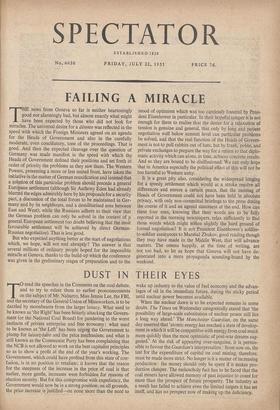DUST IN THEIR EYES
TO read the speeches in the Commons on the coal debate, and to try to relate them to earlier pronouncements on the subject of Mr. Nabarro, Miss Jennie Lee, the FBI, and the secretary of the General Union of Mineworkers, is to be dazzled by moonbeams from the larger lunacy. What used to be known as 'the Right' has been bitterly attacking the Govern- ment (or the National Coal Board) for pandering to the worst instincts of private enterprise and free economy : what used to be known as 'the Left' has been urging the Government to plump for laissez-faire and the price mechanism; and what is still known as the Communist Party has been complaining that the NCB is not allowed to work on the best capitalist principles so as to show a profit at the end of the year's working. The Government, which could have profited from this state of con- fusion, is in no position to retaliate; it knows that the reason for the steepness of the increase in the price of coal is that earlier, more gentle, increases were forbidden for reasons of election security. But for this compromise with expediency, the Government would now be in a.strong position; on all grounds, the price increase is justified—on none more than the need to wake up industry to the value of fuel economy and the advan- tages of oil in the immediate future, during the sticky period until nuclear power becomes available.
When the nuclear dawn is to be expected remains in some doubt. The Times on Wednesday categorically stated that 'the possibility of large-scale substitution of nuclear power still lies a long way ahead.' The Manchester Guardian, on the same day asserted that 'atomic energy has reached a state of develop- ment in which it will be competitive with energy from coal much more quickly than the most optimistic of post-war dreams sug- gested.' At the risk of appearing over-sanguine, it is permis- sible to favour the Guardian's interpretation : from now on, the test for the expenditure of capital on coal mining, therefore, must be made more strict. No longer is it a matter of increasing production : the money should only be spent if it makes pro- duction cheaper. The melancholy fact has to be faced that the coal miners have allowed memory of past injustice to count for more than the prospect of future prosperity. The industry as a result has failed to achieve even the limited targets it has set itself, and has no prospect now of making up the deficiency. Nationalisation has not helped, because it has not brought the identification of the miner with his industry that was hoped for; restrictive practices in the mines have remained—the miners have continued to behave under the NCB as they used to behave when they were capitalist wage-slaves. Admittedly, this is largely the fault of the foolish policies of governments and mine-owners in the Twenties. But it is now rather a long time since the Twenties. The miners, like the railwaymen, would do well to realise that their prosperity will very soon depend on the community, and not vice versa.



















































 Previous page
Previous page